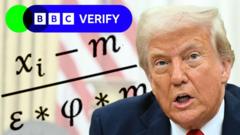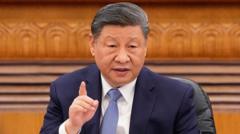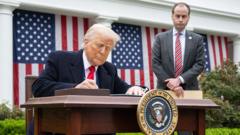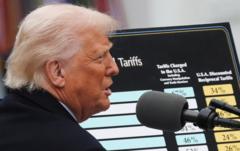Trump's collaboration with Milei raises questions about the motivations underlying U.S. foreign policy, as focus shifts from economic partnerships to personal admiration.
Trump's Affection for Milei: A Study in Political Alliances and Cultural Affirmation

Trump's Affection for Milei: A Study in Political Alliances and Cultural Affirmation
Amid tariff controversies, President Trump reaffirms his alliance with Argentine President Javier Milei, emphasizing cultural validation over economic alliances.
In the aftermath of President Trump's latest round of sweeping tariffs, he is scheduled to meet with Argentine President Javier Milei at Mar-a-Lago, who has expressed unwavering praise for Trump. This meeting marks Milei's tenth visit to the U.S. as president, and the connection between the two leaders emphasizes the cultural aspect of political relationships.
Milei's attendance at a right-wing gala in Florida coincides with Trump’s travel plans, and the event will also see Trump receiving an award. Despite Argentina's historically fraught economic standing and its nominal significance in global geopolitics, Trump's apparent elevation of Milei to a position of importance reflects a desire for admiration rather than strategic partnership.
The U.S. under Trump has often been characterized by its focus on relationships that protect American interests. Yet, the embrace of Milei raises questions about the broader implications of personal connections superseding traditional economic alliances. With Milei having met Trump or notable figures like Elon Musk on nearly every visit, it appears that the personal rapport and public praise from Milei serve as a form of validation for Trump's administration, potentially altering the dynamics of U.S. foreign policy to prioritize admiration and ideological alignment over conventional economic utility.
As political analysts observe these developments, the emphasis on culture wars over hard economic considerations might reshape how alliances are formed and maintained on the global stage, possibly committing the U.S. to partnerships that may not be in its best economic interests.
Milei's attendance at a right-wing gala in Florida coincides with Trump’s travel plans, and the event will also see Trump receiving an award. Despite Argentina's historically fraught economic standing and its nominal significance in global geopolitics, Trump's apparent elevation of Milei to a position of importance reflects a desire for admiration rather than strategic partnership.
The U.S. under Trump has often been characterized by its focus on relationships that protect American interests. Yet, the embrace of Milei raises questions about the broader implications of personal connections superseding traditional economic alliances. With Milei having met Trump or notable figures like Elon Musk on nearly every visit, it appears that the personal rapport and public praise from Milei serve as a form of validation for Trump's administration, potentially altering the dynamics of U.S. foreign policy to prioritize admiration and ideological alignment over conventional economic utility.
As political analysts observe these developments, the emphasis on culture wars over hard economic considerations might reshape how alliances are formed and maintained on the global stage, possibly committing the U.S. to partnerships that may not be in its best economic interests.





















